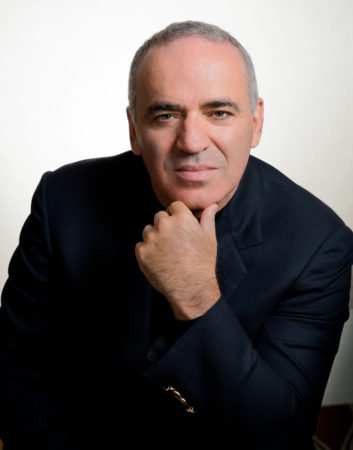

BY SUMAN LAYAK, ET BUREAU | JUN 18, 2017
ORIGINAL ARTICLE AT THE ECONOMIC TIMES
In an email interview with ET, New York-based Kasparov shares his views on chess, AI, Donald Trump and Vladimir Putin.
 Over the last 12 years, Russian chess Grandmaster Garry Kasparov has been a writer, human rights and democracy activist and a sometime chess-coach-cum adviser to top players. For an earlier generation, Kasparov is a superstar, probably the greatest ever chess player, a World Champion at the age of 22 in 1985 and a flag-bearer for human intelligence in matches against the IBM supercomputer Deep Blue (Kasparov won the first match in 1996 but lost the re-match in 1997). Twenty years later, Kasparov has written a book on the match, Deep Thinking: Where Machine Intelligence Ends and Human Creativity Begins. In an email interview with Suman Layak, New York-based Kasparov shares his views on chess, AI, Donald Trump and Vladimir Putin. Edited excerpts:
Over the last 12 years, Russian chess Grandmaster Garry Kasparov has been a writer, human rights and democracy activist and a sometime chess-coach-cum adviser to top players. For an earlier generation, Kasparov is a superstar, probably the greatest ever chess player, a World Champion at the age of 22 in 1985 and a flag-bearer for human intelligence in matches against the IBM supercomputer Deep Blue (Kasparov won the first match in 1996 but lost the re-match in 1997). Twenty years later, Kasparov has written a book on the match, Deep Thinking: Where Machine Intelligence Ends and Human Creativity Begins. In an email interview with Suman Layak, New York-based Kasparov shares his views on chess, AI, Donald Trump and Vladimir Putin. Edited excerpts:
On why the book has come 20 years after the match.
The approach of the 20th anniversary of the 1997 rematch was the catalyst, but I wouldn’t have written Deep Thinking if I hadn’t felt ready. It was still painful to look back at that catastrophe, but enough time had passed to be objective, to find the truth, even if it was unpleasant. The other factor was that I had a lot more to say about intelligent machines and human-machine relationship. I felt that this could be an important message for others as well.
On whether he would do it again
No, the strength of today’s chess machines makes me quite happy I’m retired! A free app on your smartphone is stronger than Deep Blue ever was. And a top engine on a decent laptop is likely unbeatable by even the best human on a good day. Engines don’t play perfectly, but they don’t make enough mistakes of the magnitude required for a human to beat them. Draw, yes, but probably not win. It was my blessing and curse to be the World Champion during the period in which chess computers went from laughably weak to practically unbeatable. It was a fascinating moment in my life, but in the historical perspective it’s a tiny blip.
On whether computers can take up human jobs, replace chess coaches
Job loss to intelligent automation is a critical topic, but one of the reasons I wrote Deep Thinking was because we are looking at it the wrong way, with dangerous repercussions. Worry about people, not jobs, not professions. The evolution of human civilisation is the replacement of human labour by technology. That’s progress. It’s essential, and makes our lives better, longer, more comfortable and productive. We should be concerned about what people will do if their tasks are taken over by machines, yes, but that problem will only get worse if we slow down instead of speed up automation and the development of new technology. Industries that automate also expand, leading to the creation of better jobs, even new industries. We need to focus on how to train people who are being displaced, how to keep them active. The good news is that smarter tools are also easier to use with less training. Computers are already teaching kids to play chess! But there will always be a place for human coaches and teachers, to help kids reach their potential — and not only in chess. With an infinite amount of information at everyone’s fingertips, it’s ridiculous to preserve the old teacher-student relationship. Teachers today should focus on teaching kids how to learn, not what to learn. Training methods and critical thinking are still essential.
On opponents Anatoly Karpov, Viswanathan Anand, Vladimir Kramnik
Enjoyed isn’t really the way to put it! In a professional game, especially in a World Championship match, it’s a life or death struggle, and even the thrill of victory leaves you exhausted. But I always felt a special surge of energy when facing Karpov who was, of course, my great rival over five World Championship matches.
Even in less consequential games later in our careers, I had a feeling like against no other opponent. We knew each other so well, and public interest was always high when we met. To answer more selfishly, my record against Anand was far better than against Karpov or Kramnik, so I suppose those games were more enjoyable in that way. Vishy was a formidable opponent so he inspired me to play my best, and more often than not it went my way.
On challenging current players
They are very strong, with Magnus Carlsen still a step above everyone else. But I haven’t been gone so long! I played many games against several of the players still near the top, especially Kramnik and Anand. Of the young generation, they are often very good technically and still need to show their fire and dedication. One reason I’m impressed with Wesley So is how hard he works. He has other chessboard talents as well, but his ability to focus and prepare is tremendous. I have no interest in big chess challenges. Top-level chess, especially classical chess, requires concentration and dedication. I have a million other things in my life today, from young children to books and politics. It’s not compatible with professional chess and I’m quite happy with my life.
On US President Donald Trump and Russian President Vladimir Putin
Putin long ago decided that the US was his enemy. It is the world’s most powerful nation and so it is a potential threat to his uncontested power as the dictator of Russia. And he can’t stay quiet since he needs international conflict to justify his power at home. More conflict was inevitable, but this scandal with Trump is a huge wildcard.
Why does he praise Putin, a brutal dictator who attacked the US election? Why does Russian propaganda attack the US constantly, but never say anything negative about Trump himself? So far, most of the known contacts are with Trump’s team, which has more Russian connections than Aeroflot. Trump may not be intelligent enough to be part of a grand conspiracy himself, but he may end up being prosecuted for trying to interfere in the investigation of his administration and allies, like Michael Flynn.
On the dichotomy of Edward Snowden finding sanctuary in Russia
It’s only a dichotomy if he wasn’t already working with Russian intelligence, either willingly or as a pawn. I have no special knowledge of Snowden’s activities, but his path afterwards, his welcome in Putin’s Russia and his willingness to allow himself to be used as a tool of Putin’s propaganda aren’t in his favour as a mere whistleblower or misguided zealot. You can be happy that what he exposed was exposed and still suspect he was an agent or traitor.
On democracy in Russia
There isn’t any democratic politics in Russia, only that approved by the Putin regime. The balance of power is between various camps of Putin’s allies, pushing and pulling for influence and cash, usually behind the scenes. You can’t speak of democracy or sully the word ‘election’ by talking about Russia. It’s a joke, a show to distract people, nothing more. Russia is a dictatorship and anyone who posed any sort of real challenge to Putin’s grip on power would be dead, in jail, or exiled.

